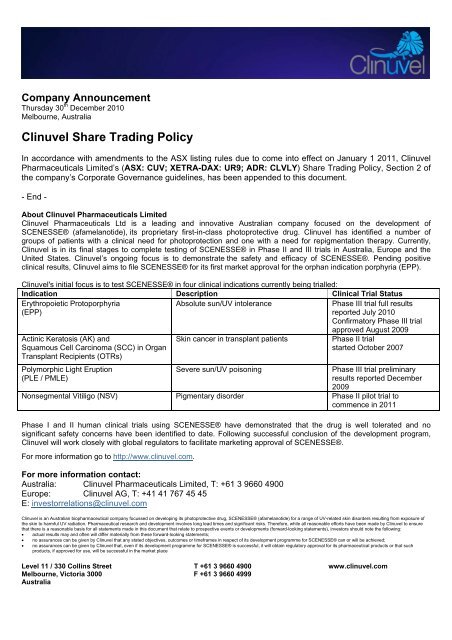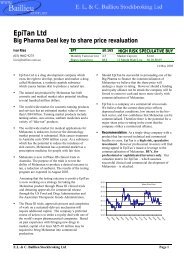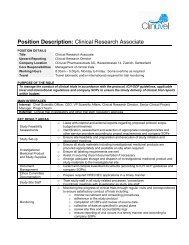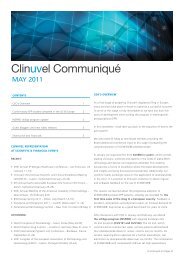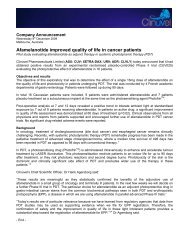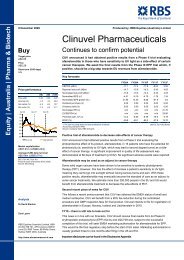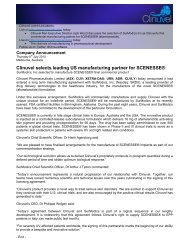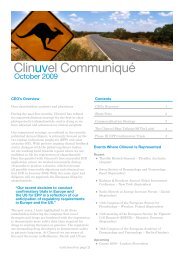Company Announcement - Clinuvel Pharmaceuticals
Company Announcement - Clinuvel Pharmaceuticals
Company Announcement - Clinuvel Pharmaceuticals
Create successful ePaper yourself
Turn your PDF publications into a flip-book with our unique Google optimized e-Paper software.
<strong>Company</strong> <strong>Announcement</strong><br />
Thursday 30 th December 2010<br />
Melbourne, Australia<br />
<strong>Clinuvel</strong> Share Trading Policy<br />
In accordance with amendments to the ASX listing rules due to come into effect on January 1 2011, <strong>Clinuvel</strong><br />
<strong>Pharmaceuticals</strong> Limited’s (ASX: CUV; XETRA-DAX: UR9; ADR: CLVLY) Share Trading Policy, Section 2 of<br />
the company’s Corporate Governance guidelines, has been appended to this document.<br />
- End -<br />
About <strong>Clinuvel</strong> <strong>Pharmaceuticals</strong> Limited<br />
<strong>Clinuvel</strong> <strong>Pharmaceuticals</strong> Ltd is a leading and innovative Australian company focused on the development of<br />
SCENESSE® (afamelanotide), its proprietary first-in-class photoprotective drug. <strong>Clinuvel</strong> has identified a number of<br />
groups of patients with a clinical need for photoprotection and one with a need for repigmentation therapy. Currently,<br />
<strong>Clinuvel</strong> is in its final stages to complete testing of SCENESSE® in Phase II and III trials in Australia, Europe and the<br />
United States. <strong>Clinuvel</strong>’s ongoing focus is to demonstrate the safety and efficacy of SCENESSE®. Pending positive<br />
clinical results, <strong>Clinuvel</strong> aims to file SCENESSE® for its first market approval for the orphan indication porphyria (EPP).<br />
<strong>Clinuvel</strong>'s initial focus is to test SCENESSE® in four clinical indications currently being trialled:<br />
Indication Description Clinical Trial Status<br />
Erythropoietic Protoporphyria<br />
(EPP)<br />
Absolute sun/UV intolerance<br />
Phase III trial full results<br />
reported July 2010<br />
Confirmatory Phase III trial<br />
Actinic Keratosis (AK) and<br />
Squamous Cell Carcinoma (SCC) in Organ<br />
Transplant Recipients (OTRs)<br />
Polymorphic Light Eruption<br />
(PLE / PMLE)<br />
Skin cancer in transplant patients<br />
Severe sun/UV poisoning<br />
approved August 2009<br />
Phase II trial<br />
started October 2007<br />
Phase III trial preliminary<br />
results reported December<br />
2009<br />
Nonsegmental Vitiligo (NSV) Pigmentary disorder Phase II pilot trial to<br />
commence in 2011<br />
Phase I and II human clinical trials using SCENESSE® have demonstrated that the drug is well tolerated and no<br />
significant safety concerns have been identified to date. Following successful conclusion of the development program,<br />
<strong>Clinuvel</strong> will work closely with global regulators to facilitate marketing approval of SCENESSE®.<br />
For more information go to http://www.clinuvel.com.<br />
For more information contact:<br />
Australia: <strong>Clinuvel</strong> <strong>Pharmaceuticals</strong> Limited, T: +61 3 9660 4900<br />
Europe: <strong>Clinuvel</strong> AG, T: +41 41 767 45 45<br />
E: investorrelations@clinuvel.com<br />
<strong>Clinuvel</strong> is an Australian biopharmaceutical company focussed on developing its photoprotective drug, SCENESSE® (afamelanotide) for a range of UV-related skin disorders resulting from exposure of<br />
the skin to harmful UV radiation. Pharmaceutical research and development involves long lead times and significant risks. Therefore, while all reasonable efforts have been made by <strong>Clinuvel</strong> to ensure<br />
that there is a reasonable basis for all statements made in this document that relate to prospective events or developments (forward-looking statements), investors should note the following:<br />
• actual results may and often will differ materially from these forward-looking statements;<br />
• no assurances can be given by <strong>Clinuvel</strong> that any stated objectives, outcomes or timeframes in respect of its development programme for SCENESSE® can or will be achieved;<br />
• no assurances can be given by <strong>Clinuvel</strong> that, even if its development programme for SCENESSE® is successful, it will obtain regulatory approval for its pharmaceutical products or that such<br />
products, if approved for use, will be successful in the market place<br />
Level 11 / 330 Collins Street T +61 3 9660 4900 www.clinuvel.com<br />
Melbourne, Victoria 3000 F +61 3 9660 4999<br />
Australia
SECTION 2 – SHARE TRADING POLICY<br />
1. INTRODUCTION<br />
<strong>Company</strong> directors and employees, like other individuals, are prohibited from insider<br />
dealing by the Corporations Act. It is a civil and criminal offence for an individual who<br />
is in possession of material price-sensitive information to deal in securities where that<br />
information is not generally available. It is also an offence to procure other persons to<br />
deal in the <strong>Company</strong>’s securities and to disclose inside information with a view to<br />
others profiting from that information.<br />
This share trading policy sets out the policy and procedures relating to the dealing by<br />
directors, employees and certain consultants employed by the <strong>Company</strong> in the securities<br />
(eg, shares, preference shares and options) of the <strong>Company</strong>. The policy and procedures<br />
have been developed having regard to Australian law and best corporate governance<br />
practice. The purpose of the policy is to provide the <strong>Company</strong>'s directors with strict<br />
guidelines to be complied with in any proposed dealing in the <strong>Company</strong>'s securities.<br />
Dealing includes any subscription, redemption, purchase, sale, entering into any<br />
agreement to effect the same, exercise of an option or other right or entering into any<br />
other form of agreement to acquire or dispose of an interest in securities<br />
2. SUMMARY OF THE AUSTRALIAN LAW<br />
A director, employee or any other person must not engage in ‘insider trading’ – that is,<br />
they must not deal in any securities of the <strong>Company</strong> where:<br />
(a) he/she is in possession of information which is not generally available; and<br />
(b) that information may have a material effect on the price or value of the<br />
securities of the <strong>Company</strong>; and<br />
(c) they know or ought reasonably to know that the information is not generally<br />
available and if it were it might have a material effect on the price or value of<br />
the securities.<br />
In addition, a director, employee or consultant with inside information must not procure<br />
another person to deal in the <strong>Company</strong>’s securities nor communicate the information<br />
(directly or indirectly) to another person who the person believes may deal (or procure<br />
someone else to deal) in the <strong>Company</strong>’s securities.<br />
Procuring means enticing, encouraging, persuading, causing or securing another person<br />
to do something. It includes inciting, inducing or encouraging an act or omission.<br />
Information is ‘generally available’ if:<br />
(a)<br />
(b)<br />
it consists of readily observable matter;<br />
it has been made known in a manner likely to bring it to the attention of<br />
investors in securities of corporations of that kind and a reasonable period for<br />
dissemination of that information has elapsed. For example, this means it has<br />
been released to the ASX, published in an Annual Report or prospectus or<br />
otherwise been made generally available to the investing public and a<br />
reasonable period of time has elapsed after the information has been<br />
disseminated in one of these ways; or<br />
Adopted 1 April 2005<br />
Amended November 2009 page 17
(c)<br />
it may be deduced, inferred or concluded from methods of dissemination such<br />
as the above.<br />
Information is defined broadly for the purposes of the insider trading provisions of the<br />
Corporations Act and includes matters of supposition and other matters that are<br />
insufficiently definite to warrant being known to the public. It also includes matters<br />
relating to the intentions of a person.<br />
Information is likely to have a material effect on either the price or value of the<br />
securities of a company if the information would, or would be likely to, influence<br />
persons who commonly invest in securities in deciding whether or not to subscribe for,<br />
buy or sell those securities.<br />
Inside information means information which:<br />
(a) relates to particular securities or to a particular issuer or to particular issuers of<br />
securities and not to securities generally or issuers of securities generally (and,<br />
for these purposes, information shall be treated as relating to an issuer of<br />
securities which is a company not only where it is about that <strong>Company</strong> but also<br />
where it may affect that <strong>Company</strong>’s business prospects);<br />
(b)<br />
(c)<br />
(d)<br />
is specific or precise;<br />
has not been made public; and<br />
if it were made public would be likely to have a significant effect on the price<br />
or value of those securities.<br />
The prohibition directly affects directors, employees and consultants dealing in the<br />
<strong>Company</strong>'s securities, either for personal gain or for the gain of any other person.<br />
However, a person does not need to be a director, employee or consultant of the<br />
<strong>Company</strong> to be guilty of insider trading in relation to the <strong>Company</strong>'s securities. It also<br />
affects all companies of which they are directors, dealings by directors, employees and<br />
consultants through nominees, agents or other associates, such as family members,<br />
family trusts and family companies and any other person who is encouraged to deal in<br />
the <strong>Company</strong>'s securities by the director, employee or consultant.<br />
The prohibited conduct includes dealings in securities of the <strong>Company</strong> as well as of<br />
other companies with which the <strong>Company</strong> may be dealing where an employee possesses<br />
‘inside information’ in relation to that other company. For example, where a director,<br />
employee or consultant is aware that the <strong>Company</strong> is about to sign a major agreement<br />
with another company, you should not buy shares in either the <strong>Company</strong> or the other<br />
company.<br />
Penalties for breach of the prohibition are severe and include:<br />
Χ<br />
Χ<br />
in the case of a natural person:<br />
(a) a criminal penalty up to $220,000 or imprisonment for 5 years or both;<br />
and<br />
(b) a pecuniary penalty of $200,000 for civil liability; and<br />
in the case of a body corporate:<br />
(a) a criminal penalty up to $1,100,000; and<br />
(b) a pecuniary penalty of $1,000,000 for civil liability.<br />
Adopted 1 April 2005<br />
Amended November 2009 page 18
In addition, a person who contravenes or is involved in a contravention of these<br />
provisions may be liable to compensate any person who suffers loss or damage because<br />
of the contravention.<br />
The prohibition does not apply to subscriptions for shares by directors or employees<br />
made under an employee share scheme, shares issued under a dividend reinvestment<br />
plan or any new issues in which all shareholders are entitled to participate.<br />
3. DEALINGS BY DIRECTORS, EMPLOYEES AND CONSULTANTS<br />
It is the policy of the <strong>Company</strong> that no director, employee or consultant may deal in the<br />
<strong>Company</strong>'s securities unless the procedures set out below have been strictly complied<br />
with.<br />
3.1 Guidance on dealings<br />
For the avoidance of doubt, the following constitute dealing for the purposes of this<br />
policy and are consequently subject to the provisions of this policy:<br />
(a) buying or selling securities;<br />
(b) subscribing for new shares;<br />
(c) entry into an agreement to subscribe for, buy or sell, securities;<br />
(d) the grant to, or acceptance by such person or entity of any option relating to<br />
such securities or of any other right or obligation, present or future, conditional<br />
or unconditional, to acquire or dispose of such securities;<br />
(e)<br />
(f)<br />
(g)<br />
(h)<br />
arrangements which involve a sale of securities with the intention of<br />
repurchasing an equal number of such securities soon afterwards;<br />
dealings between directors and/or employees and/or certain consultants of the<br />
<strong>Company</strong>'s;<br />
off-market dealings; and<br />
transfers for no consideration by a director.<br />
The following dealings are not subject to the provisions of this policy:<br />
(a) undertakings or elections to take up entitlements under a rights issue or other<br />
offer (including an offer of securities in lieu of a cash dividend);<br />
(b)<br />
(c)<br />
(d)<br />
(e)<br />
the take up of entitlements under a rights issue or other offer (including an<br />
offer of securities in lieu of a cash dividend);<br />
allowing entitlements to lapse under a rights issue or other offer (including an<br />
offer of shares in lieu of a cash dividend);<br />
the sale of sufficient entitlements nil-paid to allow take up of the balance of the<br />
entitlements under a rights issue;<br />
undertakings to accept, or the acceptance of, a takeover offer.<br />
3.2 Directors, Employees and Consultants<br />
All directors, employees and consultants must comply with the terms of this policy.<br />
Any employees or consultants who are considering the purchase or sale of the<br />
<strong>Company</strong>'s securities should advise the CEO of their intention if they are in any way<br />
Adopted 1 April 2005<br />
Amended November 2009 page 19
uncertain as to whether the timing of their intention to purchase or sell securities is<br />
appropriate.<br />
3.3 Notification of dealing<br />
During their term of engagement and for three months after termination, directors,<br />
employees and consultants must receive clearance for any proposed dealing in the<br />
<strong>Company</strong>’s securities by:<br />
(a) in the case of directors, employees and consultants of the <strong>Company</strong>, providing<br />
written notice to the CEO in advance so as to obtain such clearance, and<br />
(b) in the case of the CEO, providing written notice to the Chair in advance so as<br />
to obtain such clearance.<br />
Such notification must detail the number of shares or options to be traded and the<br />
timing.<br />
On notification, the CEO or the Chair (as the case may be) must advise details of the<br />
proposed trading of the <strong>Company</strong>'s securities to all other directors, in writing.<br />
Notification must take place immediately after notice of the proposed trade is received<br />
from the director, employee or consultant. The notification procedure applies at all<br />
times, and is to be complied with for all parcels of securities proposed to be bought or<br />
sold or otherwise the subject of a dealing.<br />
On notification, each board member is allowed five (5) business days to comment on<br />
the proposed trade and a majority of the board must approve the trade in writing.<br />
Subject to the provisions of this Share Dealing Code being complied with, such<br />
approval will not be unreasonably withheld. When a majority of the board has approved<br />
the trade and the five (5) business days has elapsed, the trade may proceed and must be<br />
completed within the next five (5) business days, providing the <strong>Company</strong>, its directors,<br />
employees or consultants are not in possession of price-sensitive information which<br />
would prohibit trading.<br />
The Board may determine that directors, employees and consultants with total<br />
ownership of securities below a certain threshold is to be approved using a different<br />
procedure.<br />
3.4 Circumstances where clearance most appropriate<br />
As a matter of practice, the following periods are the most appropriate times for<br />
directors, employees and consultants to deal in securities of the <strong>Company</strong>:<br />
(a) in the four weeks following the day after the release of the annual accounts;<br />
(b) in the four weeks following the day after the release of the half-yearly accounts;<br />
and<br />
(c) in the four weeks following the day after the annual general meeting (on the basis<br />
that any developments of a price sensitive nature since the release of the annual<br />
accounts will be announced by the Chair at the meeting),<br />
except where the director, employee or consultant is in possession of price-sensitive<br />
information which has not been made generally available.<br />
Adopted 1 April 2005<br />
Amended November 2009 page 20
3.5 Limitations and guidelines on dealing<br />
Directors, employees and consultants must recognise that they may have ownership of<br />
large blocks of stock that could unduly affect the market for the company’s stock if they<br />
are not marketed in an orderly manner or in accordance with the requirements of the<br />
Corporations Act.<br />
Accordingly, unless further Board approval is obtained, the following limitations apply:<br />
(a) A director, employee or consultant may not sell securities exceeding one-third<br />
of the average daily trading volume for the last 180 days directly on the market<br />
in any one month. This limitation applies every month and may not be<br />
accumulated – ie, a quantity not sold one month may not be added to the next<br />
month. This limitation does not apply to any off-market transfers or transfers<br />
which occur via a “crossing” or similar such transaction.<br />
(b) A director, employee or consultant may not sell securities where the sale would<br />
require a disclosure document to be issued pursuant to the provisions of the<br />
Corporations Act. (Where no disclosure document is required to be issued,<br />
directors, employees and consultants may, subject to the remainder of this<br />
clause 3.5, sell any amount of shares or options in private, off-market<br />
transactions to institutional or sophisticated investors);<br />
(c)<br />
Directors, employees and consultants must not “shop” an excessive number of<br />
brokers and/or potential buyers or sellers so that the sale becomes widely<br />
known. They must proceed in a discrete manner when buying or selling<br />
securities and be mindful of the effect of their actions on the market and the<br />
perceptions of investors.<br />
Failure to observe these Guidelines for trading shares is a serious matter and will result<br />
in disciplinary action by the board.<br />
3.6 No dealing in prohibited period<br />
Subject to paragraph 3.12, a director, employee or consultant must not deal in any<br />
securities of the <strong>Company</strong> during a prohibited period. A ‘prohibited period’ means:<br />
(a) any ‘close period’ (see section 3.7 below);<br />
(b) any period when there exists any matter which constitutes inside information in<br />
relation to the <strong>Company</strong>'s securities (whether or not the director, employee or<br />
consultant has knowledge of such matter); or<br />
(c)<br />
any period when any director, employee or consultant has reason to believe<br />
that the proposed dealing is in breach of this policy.<br />
3.7 Close periods<br />
For the purpose of this policy, and in particular paragraph 3.6(a), a ‘close period’ is:<br />
(a) the period of two months immediately preceding the preliminary<br />
announcement of the <strong>Company</strong>'s annual results or, if shorter, the period from<br />
the end of the relevant financial year to and including the time of the<br />
announcement; and<br />
(b)<br />
if the <strong>Company</strong> reports on a half-yearly basis, the period of two months<br />
immediately preceding the announcement of the half-yearly results or, if<br />
shorter, the period from the end of the relevant financial period to and<br />
including the time of the announcement; and<br />
Adopted 1 April 2005<br />
Amended November 2009 page 21
(c)<br />
except as provided in paragraphs (a) and (b) for the half year and end of<br />
financial year respectively, if the <strong>Company</strong> also reports on a quarterly basis,<br />
the period of one month immediately preceding the announcement of the<br />
quarterly results or, if shorter, the period from the end of the relevant financial<br />
period to and including the time of the announcement.<br />
3.8 Short term dealing<br />
A director, employee or consultant must not deal in any securities of the <strong>Company</strong> on<br />
considerations of a short term nature. That is, directors, employees and consultants may<br />
not buy and sell securities within a 3 month period without permission from the CEO.<br />
In addition, directors, employees and consultants may not enter into any short term<br />
dealings (eg, forward contracts) without permission from the CEO.<br />
3.9 ‘Insider trading’<br />
A director, employee or consultant must not deal in any securities of the <strong>Company</strong> at<br />
any time when he/she is in possession of inside information in relation to the <strong>Company</strong><br />
or those securities (as defined under Australian law).<br />
3.10 Exercise of employee rights or options<br />
On written application by a director, employee or consultant, the Chair or CEO may<br />
allow the exercise of an option or right under an employee share scheme, or the<br />
conversion of a convertible security, where the final date for the exercise of such option<br />
or right, or conversion of such security, falls during any prohibited period and the<br />
director, employee or consultant could not reasonably have been expected to exercise it<br />
at an earlier time when he/she was free to deal.<br />
Where an exercise or conversion is permitted pursuant to paragraph 3.10 of this policy,<br />
the Chair or CEO may not give clearance for the sale of securities acquired pursuant to<br />
such exercise or conversion during the prohibited period.<br />
3.11 Dealing in exceptional circumstances<br />
In exceptional circumstances a director, employee or consultant may sell (but not<br />
purchase) securities when he/she would otherwise be prohibited from doing so only<br />
because the proposed sale would fall within a close period. However, trading must not<br />
take place if the CEO or other director is aware of any other reason why the director,<br />
employee or consultant would be prohibited from dealing by this policy. An example of<br />
the type of circumstance which may be considered exceptional for these purposes would<br />
be severe personal hardship or a pressing financial commitment on the part of the<br />
director, employee or consultant that cannot otherwise be satisfied. The determination<br />
of whether circumstances are exceptional for this purpose must be made by a majority<br />
decision of the board.<br />
3.12 Director acting as trustee<br />
Where a director is a sole trustee (other than a bare trustee), the provisions of this policy<br />
will apply as if he/she were dealing on his/her own account. Where a director is a cotrustee<br />
(other than a bare trustee), he/she must advise his/her co-trustees that he/she is a<br />
director of the <strong>Company</strong>. If he/she is not a beneficiary, a dealing in the <strong>Company</strong>'s<br />
securities undertaken by that trust will not be regarded as a dealing by the director for<br />
the purposes of this policy where the decision to deal is taken by the other trustees<br />
acting independently of the director or by investment managers on behalf of the<br />
trustees. The other trustees will be assumed to have acted independently of the director<br />
for this purpose where they:<br />
Adopted 1 April 2005<br />
Amended November 2009 page 22
(a)<br />
have taken the decision to deal by a majority without consultation with, or<br />
other involvement of, the director concerned; or<br />
(b) if they have delegated the decision making to a committee of which the<br />
director is not a member.<br />
3.13 Dealings by connected persons and investment managers<br />
A director must (so far as is consistent with his/her duties of confidentiality to the<br />
<strong>Company</strong>) seek to prohibit (by taking the steps set out in paragraph 3.14 of this policy)<br />
any dealing in securities of the <strong>Company</strong> during a close period or at a time when the<br />
director is in possession of unpublished price sensitive information in relation to those<br />
securities and would be prohibited from dealing under paragraphs 3.9 or 3.6(b) of this<br />
policy:<br />
(a) by or on behalf of any person related to him or her (within the meaning of the<br />
term ‘related entity’ in the Corporations Act), which includes the director’s<br />
spouse, de facto, family members, associated trusts, companies or other third<br />
parties contemplating the acquisition or sale of securities on the director’s<br />
behalf (and also includes any company over which such persons or entities<br />
have 20% of its equity or voting rights); or<br />
(b)<br />
by an investment manager on his/her behalf or on behalf of any person<br />
associated with him/her where either he/she or any person connected with<br />
him/her has funds under management with that investment manager, whether<br />
or not discretionary (save as provided in paragraph 3.12 of this policy).<br />
3.14 Director’s duty to notify connected persons<br />
For the purposes of paragraph 3.13 of this policy, a director must advise all such<br />
connected persons and investment managers:<br />
(a) that he/she is a director of the <strong>Company</strong>;<br />
(b) of the close periods during which they cannot deal in the <strong>Company</strong>'s securities;<br />
(c) of any other periods when the director knows he/she is not free to deal in<br />
securities of the <strong>Company</strong> under the provisions of this policy unless his/her<br />
duty of confidentiality to the <strong>Company</strong> prohibits him from disclosing such<br />
periods; and<br />
(d)<br />
that they must advise him/her immediately after they have dealt in securities of<br />
the <strong>Company</strong> (save as provided in paragraph 3.12 of this policy).<br />
3.15 Clearance records<br />
A written record must be maintained by the <strong>Company</strong> of the receipt of any advice or<br />
notification received from a director, employee or consultant pursuant to paragraph 3.3<br />
of this policy. If requested by the director, employee or consultant concerned, written<br />
confirmation from the <strong>Company</strong> that such advice has been recorded must be given to<br />
the director, employee or consultant concerned.<br />
3.16 List of dealings<br />
A list of dealings in the securities of the <strong>Company</strong> since the date of the last Board<br />
meeting should be circulated to members of the board with the board papers for each<br />
board meeting where such dealings are:<br />
(a) by or on behalf of a director, employee or consultant;<br />
Adopted 1 April 2005<br />
Amended November 2009 page 23
(b)<br />
(c)<br />
by connected persons of a director, employee or consultant; or<br />
by investment managers on behalf of either a director, employee or consultant<br />
or an associate of a director, employee or consultant (unless paragraph 3.12 of<br />
this policy applies).<br />
3.17 ASX notification<br />
The Corporations Act obliges any director dealing in the <strong>Company</strong>'s securities to notify<br />
the ASX within 14 days after that dealing. ASX Listing Rule 3.19A obliges the<br />
<strong>Company</strong> to make the same notification within 5 business days. Accordingly, to enable<br />
the <strong>Company</strong> to fulfil its obligations, each director must advise the CEO and the<br />
<strong>Company</strong> Secretary of any dealing in the <strong>Company</strong>'s securities within 2 business days<br />
after that dealing. The advice must detail the date, number and class of securities<br />
acquired or sold, whether the director’s interest in the security is direct or indirect (and<br />
the nature of the indirect interest if relevant), the remaining securities held by the<br />
director, value/consideration and the nature of change (eg, on-market trade, off-market<br />
trade, exercise of options, etc).<br />
The <strong>Company</strong> Secretary will lodge, or cause to be lodged, the necessary notification<br />
with the ASX.<br />
Adopted 1 April 2005<br />
Amended November 2009 page 24


